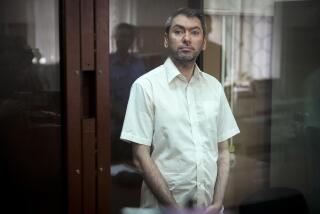Sakharov Tentatively Cleared for Visit to U.S.
- Share via
MOSCOW — Andrei D. Sakharov, who spent six years in internal exile for human rights campaigning, said Friday that the Kremlin has tentatively approved his first foreign trip: a journey to the United States next month.
At a Moscow news conference, Sakharov said authorities have agreed “in principle” to let him travel to the United States but have not yet issued travel documents.
The lifting of the travel ban against Sakharov marked another reversal in Kremlin policy by President Mikhail S. Gorbachev, who has liberalized Soviet society on many fronts.
Sakharov, 67, a physicist known as the father of the Soviet hydrogen bomb, had been denied permission to travel on grounds that he had access to sensitive information while working on the bomb in the 1950s.
He has spoken out repeatedly for free emigration and protested the Soviet intervention in Afghanistan in 1979. For his human rights activities, he was awarded the 1975 Nobel Peace Prize.
In 1980, Sakharov was exiled to the closed city of Gorky. He was released under Gorbachev’s administration in December, 1986.
‘Very Big Changes’
“I consider that the positive response making my trip possible stems from the very big changes in our country during the last few years,” Sakharov told the news conference.
He said he plans to attend a Nov. 15-16 meeting in Washington of a philanthropic group called the International Foundation for the Survival and Development of Humanity. The foundation was set up in January to help solve environmental, human rights, disarmament and economic development problems.
While in Washington, Sakharov will receive the $50,000 Albert Einstein Foundation Peace Prize for 1988, the foundation announced. The prize is designed “to foster and advance prospects for world peace and to demonstrate to the world that individuals can and do make a difference,” Robert Swartz, a foundation director, said in Washington.
Sakharov is also tentatively scheduled to attend meetings in Los Angeles, San Francisco, Boston, New York and Chicago during his trip, which may last about two weeks, foundation officials said.
The physicist said his wife, Yelena Bonner, will not travel with him to the United States.
The U.S. State Department welcomed the Soviet decision but urged Moscow to give the same permission to all Soviets wishing to travel abroad.
“Soviet use of alleged knowledge of state secrets to deny many other Soviet citizens the right to travel abroad is deplorable and inconsistent with Soviet commitments under the Helsinki accords,” said spokesman Charles Redman.
More to Read
Sign up for Essential California
The most important California stories and recommendations in your inbox every morning.
You may occasionally receive promotional content from the Los Angeles Times.













